Enab Baladi’s Investigation Team
Dia Odeh | Murad Abdul Jalil | Nour Dalati
Tripartite race to win clans’ support
With the outbreak of the Syrian revolution, the organizers of the Syrian Revolution Coordinators Union (SYRCU) named the 10th of June 2011 as the “Friday of Clans,” in a move aimed at encouraging the Syrian clans to participate in the demonstrations against the Syrian regime, at a time when the area of protests had been expanding to most Syrian regions.
The reliance on the clans and their uprising did not have any effect, back then, despite the participation of thousands of demonstrators. This was due to the large number of pro-regime clannish leaders and elders, while the opposition had little experience in politics and had not attracted clannish figures that would have any effect. In addition, political life within clannish community was almost non-existent, and the role this community used to represent could be considered secondary.
As the years passed by, the Syrian territory has been divided between influential parties. This has had an effect on the clannish community, which has also been divided between the parties. What used to be a tenacious clan with one sheikh and one leader in the past has turned into a fragmented clan having more than one sheikh and a leader from second and third rows. Their loyalty varies according to the regions where they live: whether to the Syrian regime or to the opposition and the Kurdish forces in the northeast of Syria, reflecting the absence and dispersion of the clans’ hierarchical structure between several parties.
There has been no serious reliance on the clans and their constituent councils after 2011 in any process or political participation in either Geneva or Astana. The rounds of negotiations and talks have been focused on delegations of the Syrian regime and the opposition, except for the Sochi Congress, which was attended by a number of clannish sheikhs in the Syrian regime’s regions.
However, the past three years have witnessed remarkable movements represented in the fervent race between the influential parties in Syria to acquire the clans’ card, in conjunction with the talk about a close political solution after eight years of military operations on the ground. This raises questions about the level of influence of the clans’ card in the current or upcoming political situation in Syria, and the clan’s ability to make any change whether it has or has no previous experiences in this.
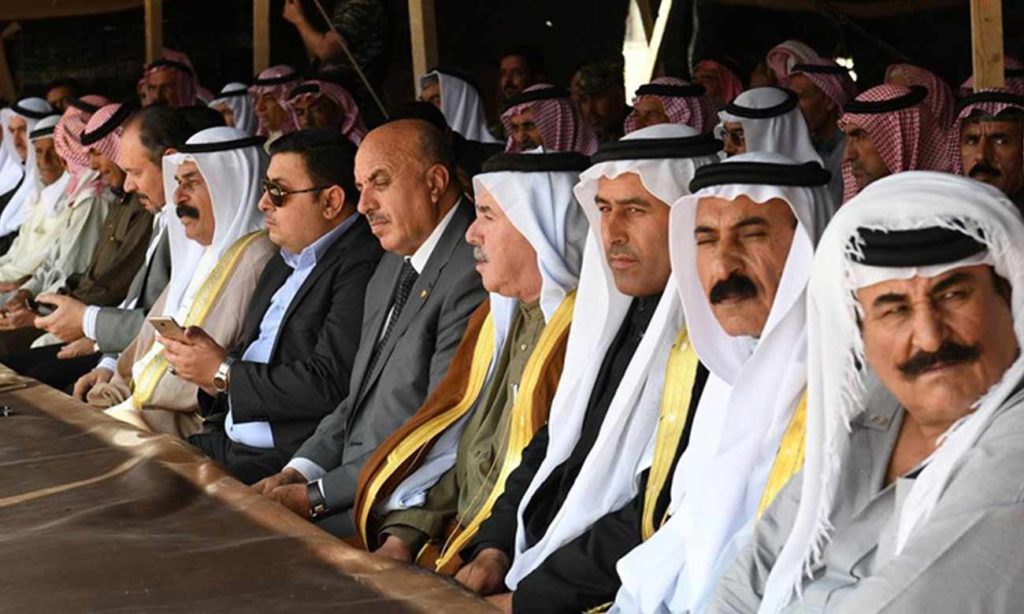
Sheikhs of clans in the regime-sponsored clannish conference in the countryside of Aleppo – June 3, 2018 (SANA)
The regime draws the card from the countrysides of Aleppo and Hama
The influential parties in Syria are the “Syrian regime” and its Russian and Iranian allies, the US-backed Kurdish forces, as well as the Turkish-backed Syrian opposition in the north of Syria.
In June 2018, the Syrian regime sponsored a conference including more than 70 clans and tribes in Syria in the eastern countryside of Aleppo. The conference, which was called “Syrian Clans against Foreign and American Intervention in Syria” and was held in Deir Hafer area in the eastern countryside of Aleppo, issued a final statement stipulating the formation of a combat unit against the US, French and Turkish presence.
At the time, the official SANA news agency reported that the participants stressed “their absolute rejection of any military presence from any country without the consent or coordination with the Syrian state, and that otherwise is considered an illegal presence and an aggression that will be repelled by all available means.”
The final statement issued by the conference incorporated a number of items, including “adherence to and preservation of the unity of the Syrian Arab Republic’s land and people with its internationally known borders.”
The statement also included the announcement of the formation of “popular clannish resistance units to expel the American, Turkish and French occupying invaders.”
The conference held in the countryside of Aleppo has not been the only conference that the Syrian regime has organized to attract the clans in its favor. A clans meeting was then held in an archaeological area in the countryside of Hama in January 2019 under the Syrian regime’s auspices. It was attended by about 1500 people, most of whom from the regime-held areas in addition to figures from the areas controlled by the Syrian Democratic Forces (SDF).”
The meeting issued a lengthy statement of 11 points, all of which reflected the regime’s discourse, vision and policy in the eastern provinces of Syria, and all seemed to be directed at the residents of the eastern region, which is controlled by the Kurdish forces. The statement defined the Syrian citizen as the “person who lived on the Syrian land,” which is “home for all its citizens, and its borders are protected under international legitimacy laws.”
SDF conference upsets the regime and the Russians
Four months after the holding of the clans conference by the regime in the countryside of Hama, the Syrian Democratic Council (SDC) held a conference for the Arab clans in the Ayn Issa Subdistrict in the northern countryside of Raqqa.
The conference was held under the title “Syrian Clans Protect the Syrian Society and Preserve its Social Contract.” It was attended by clan sheikhs from the eastern region and former head of the Kurdish Democratic Union Party (PYD), Saleh Musallam, as well as SDC officials, on top of whom Ilham Ahmed.
The clans stressed in the final statement that one of the most important obstacles and challenges in ending the Syrian conflict and crisis is caused by the exclusion and absence of the acting forces of solution and representatives of the draft advancement solution, which is largely represented in the “self-administration.”
The conference came at a time when areas in the countryside of Deir ez-Zor have been witnessing tension and demonstrations against the practices of the SDF (SDC being its political arm), and talks about the next phase of the areas of East Euphrates, especially after USA’s announcement of its intention to withdraw from Syria and making of arrangements with Turkey to establish a safe area along the border. The conference also followed the declaration of the end of ISIS.
The conference sparked angry reactions from the Syrian regime and Russia, which claimed that it “clearly aims at dividing the country and flagrantly violates the UN’s stated principles of preserving the territorial integrity and sovereignty of the State of the Syrian Arab Republic, including those set forth in Security Council resolution 2254.”
According to a statement by the Russian Foreign Ministry, most Arab tribal leaders in the east of the Euphrates are against the idea of the conference’s holding, and Washington has allocated large funds to “bribe delegates.” The ministry pointed out that the conference’s organizers recruited participants in refugee camps, including al-Hawl Refugee Camp, considering that “Washington used blackmail and force.”
Turkey gathers opposition clannish blocs
Since 2017, Turkey has worked on gathering the opposition clannish blocs advocating the Syrian revolution in a unified entity, in conjunction with the attempts made by the Syrian regime and Kurdish forces in eastern Syria.
Turkey has sought to achieve many goals. From the political side, Ankara wants an ally that supports its work along its borders with Syria, especially the eastern region, which Turkey is trying to penetrate, and which is known for its clannish nature. Therefore, it hosted the General Conference of the Supreme Council of Syrian Tribes and Clans in Istanbul between 10 and 12 January 2017, followed by two conferences of representatives of the internal opposition clans in the countrysides of Aleppo and Idlib few days later.
The final statement of the Supreme Council of Syrian Tribes and Clans issued in Azaz in December 2018 may have met the goals Turkey is wishing to achieve. The participants expressed their support for the Turkish Army’s military operation in northeastern Syria. They also stressed the need to bring the tribes together and support the endeavors Turkey is willing to achieve through northeastern Syria operation to be waged against the People’s Protection Units (YPG) and the Kurdistan Workers’ Party (PKK).
Four months after the final statement, the tribal council opened an office in Gaziantep, in east Turkey, in an attempt to “manage relationships with Turkey and connect with friends in Europe and the Arab world.”
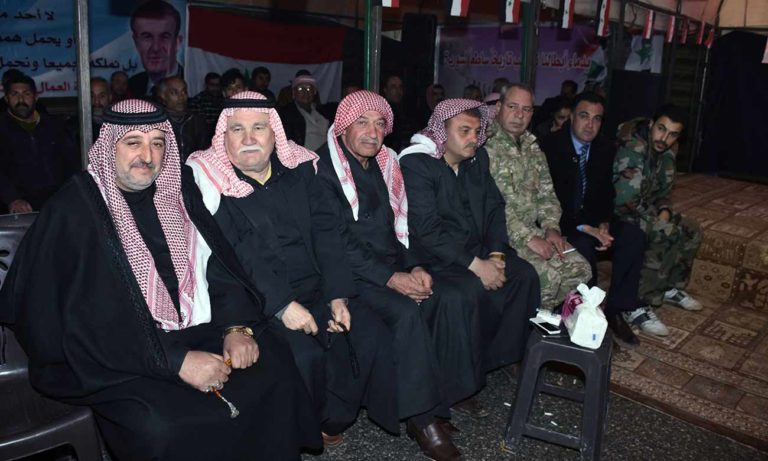
Gathering of a number of tribal and clan dignitaries in the “Homeland Tent” in Aleppo – February 9, 2019 (SANA)
Fighting over Eastern Syria:
Clans the contestants’ bridge to the area
The regime’s Ministry of Foreign Affairs described the last tribal meeting, which was held in the city of Ayn Issa in Raqqa countryside, as the “turncoat, treachery and dependence meeting.”
The Syrian regime’s intense reaction was accompanied by Russian rejection of the meeting. Russia accused the US of using the Kurds in northeastern Syria to support its plans for long-term stay; thus, undermining the political path of Astana.
Perhaps the statements made by the Russian and Syrian foreign ministries summarize the core of the race to clans in Syria. Winning the tribes to their side does not seem to be the goal that contestants want to achieve, but rather a way to win regions, influence the balance of power and change the map of control in Syria.
Enab Baladi had an interview with Soqrat al-Alou to tackle this race, the goals behind it and the winning party. Enab Baladi discussed several points highlighting the role of clans in Syria, and revealing several parties’ desire to win them by their side.
Three eyes on the east
According to the researcher Soqrat al-Alou, the US relies on the clans, constituting the social structure of the eastern region in Syria, and seeks to “entrust them and revitalize their role as the political and military ally of the US in order to contribute to the sustainability of the American presence in the region.”
Al-Alou pointed out that these attempts seek to win clans as a result of “an American prospective vision of the clan that has not changed since the nineteenth century, neglecting the social, political and economic transformations the region has undergone, which changed the role of the clan turning it into a symbolic entity in Syria.”
According to al-Alou, the reason behind such stance is “the US experience with Sahwa tribes in Iraq. However, the US is making a mistake not being able to distinguish between Iraq and Syria in terms of the structure and development of society.”
As for the regime, “it is perfectly aware that the role of the clan is symbolic in east Syria, but it is trying to deal with them as a popular incubator, which protests against the practices of SDF, that can be exploited to condemn the US presence in the region to push it out and regain control over the area.”
However, the recent conference of tribes in Ayn Issa provoked the regime. Al-Alou attributed this to the conference seeking to “ease the popular protests against the presence of SDF, while the regime relies on popular action that may trigger a revolution against SDF, causing the tribal areas to be destabilized; thereby, pushing the US to withdraw from the region, and allowing the regime to regain control.”
Meanwhile, “Turkey is seeking to enter tribal areas in the east of the Euphrates, and get closer to the people through tribal sheikhs to create a popular incubator welcoming the Turkish presence,” said al-Alou.
Clans “won’t side with SDF”
Researcher Soqrat al-Alou believes that the presence of the Arab clans in east Euphrates makes maintaining the authority of self-administration in the region difficult, due to three reasons. The first is “its inability to manage the region and provide services, especially in terms of education, health, conducting official transactions and reconstruction of infrastructure, such as roads, water and electricity,” he explained.
Second, “the PYD and its military branch (YPG) control over the SDF forces and its civil council is triggering identity troubles among the Arab population, especially with the provocative actions the Kurdish members are committing and the attempt to marginalize the Arabs at the level of local councils in their areas,” he asserted.
Third, al-Alou believes that “the SDF project is a federal entity dominated by the Kurds, while the Arab tribes and people in the region are not calling for any form of autonomous government in Syria, and they care less about the Kurdish project in Syria.”
“The structure of Kurdish self-administration is not viable because it is a rural structure that does not include any civil cities. All of the urban areas are held by the regime, such as Deir ez-Zor, al-Hasakah and destructed Raqqa. It is not possible for the Arab tribes to replace the capital Damascus and its history and civilization with another capital like Ras al-Ayn or Kobanî,” insisted al-Alou.
| Clan (or tribe): is a group of individuals bound by certain traditions and have a clan chief, even if they are not related by descent. The clan is characterized by customs and traditions, which govern society and population.
The “Syrian society is extremely tribal. Tribes are spread in the Syrian Desert, the cities and the large cities,” according to researcher Mahmoud Doughim. They do not only exist in one province or region, but in many provinces. Al-Naimi clan is one of the largest Syrian tribes. It is found in various Syrian provinces. Al-Baggara tribe is one of the largest Syrian tribes and found in al-Hasakah, Deir ez-Zor, Raqqa, Aleppo, Idlib, Hama and Daraa. The Uqaydat tribe is most commonly present in the Euphrates in addition to some other provinces. Tayy, al-Sharabin, Jubur and the Shammar tribes are based in al-Hasakah, while “al-Bouchaaban al-Zabadiah” tribe, which originally belongs to the Arabian Peninsula, is spread in a number of Syrian provinces, especially Raqqa.
|
Between Baath and post-war rule
Do the tribes have any political role?
The regime’s and the Kurds’ latest moves in Syria and Turkey aim to push tribes to accept having a political role in the future of the political process in Syria.
However, Enab Baladi interviewed two researchers and both ruled this option out, following historical and current data indication about the political role of the clan and its impact on political life. This is in addition to the composition of the Syrian clans that do not constitute cohesive units that move according to their sheikhs, rather families related through descent and geography.
Baath party marginalizes the tribes from political life
The Syrian researcher Mohannad al-Kate pointed out that the political life of the Arabs, having a tribal-based social structure in the Upper Mesopotamia, is almost non-existent. There was no political action or parties.
This is due to the ruling Baath Party’s marginalization of the role of the tribes in Syria, according to Mahmoud al-Sayed Doughim. The writer and historian explained in an interview with Enab Baladi that “since its rise to power in 1963, the party has marginalized and destroyed all the clans that fought against the French occupation and they were persecuted, while getting closer to the tribes that were loyal to France.”
According to al-Kate, the Syrian regime “has marginalized the clan and its symbols. It was forbidden in the Baath state to create a symbol other than those related to al-Assads, whether the father or son. No other Syrian citizen should have any emblematic presence, whether religious, sectarian, or tribal. Thus, the Baath party tired to terminate all kinds of blocs or organizations, especially those that belonged to the Sunni majority. ”
Al-Kate also indicated that the regime attempted to “diminish the influence of the clan leader and make his farthest ambition to become a deputy in the People’s Council, stay in the sidelines and applaud to al-Assad; in addition to impoverishing clan chief through the implementation of the laws of agrarian reform, which led to the seizure of his land. Besides, the Baath party did not hesitate to humiliate him by means of oppressive methods employed by the security services, forcing him to play a secondary role.”
Al-Kate clarified that in the absence of the state and the difficult circumstances affecting the clansmen of al-Jazira Province, the tribal role appears to be different. He added: “The locals tried to gather around the clan despite the lack of means of assistance. However, the occupation of their areas by the SDF and the massacres committed against them, in addition to being extremely weary and afraid of the Kurds’ efforts to annex their lands in order to build a long aspired nationalist state, can unify them and bring the clan members closer in no time.”
Political framing for clans in the future
Al-Kate ruled out the assumption that the political role of the clans in the future of Syria will turn into a more effective form, expecting that “there will be no political party in the name of any clan, and no clan chief will join the People’s Council. However, the clans may play a role through new political frameworks, i.e. they will be represented in the emerging political forces and parties, especially as the condition of clans have changed.”
He added: “The members of the clan belong to the elite now, including academics, doctors and engineers. They became politically aware and have understood that they can retain their clan affiliation but within a larger sense of belonging to their homeland Syria.”
According to al-Kate, “the clans will not have a role in choosing the future regime and tribal fanaticism will not be employed in future political battles due to sharp divisions in the Syrian tribal society. Today, clan members are not bound to a political decision; or else we would have all of them supporting the Syrian regime as most of the clans’ chiefs are in favor of the regime.”
This comes in contrast to neighboring Arab countries, such as Iraq and Jordan, where tribal society plays a role in supporting the political system and is considered one of the most important pillars of political stability in the face of internal and external crises.
Al-Kate explained such difference saying: “The Jordanian and Iraqi regimes have strengthened the clans’ influence. The clan’s sheikh was considered as the defender of his clan’s interests, and a high-ranking citizen with allocations from the state as well as a political authority, to become an off-record MP.”
However, in Syria, “the clan sheikh has no value,” according to al-Kate, who believes that without the current conflict and common concerns about a “Kurdish plan,” the clan sheikhs would not appear on the political scene. Thus, the current situation remains temporary until the end of the turmoil.
if you think the article contain wrong information or you have additional details Send Correction
النسخة العربية من المقال
-
Follow us :
Most viewed
- Printing Syrian currency in Europe... A file on the table
- Books make a comeback in Damascus libraries after being banned under Assad
- Complex steps to establish new Syrian army
- National Security Council in Syria: A necessity imposed by reality
- SDF-Damascus agreement in Aleppo: A test balloon for broader consensus












 Gathering of a number of clans and tribes’ dignitaries in Aleppo in the “Homeland Tent” - February 9, 2019 (SANA)
Gathering of a number of clans and tribes’ dignitaries in Aleppo in the “Homeland Tent” - February 9, 2019 (SANA)





 A
A
A
A
A
A
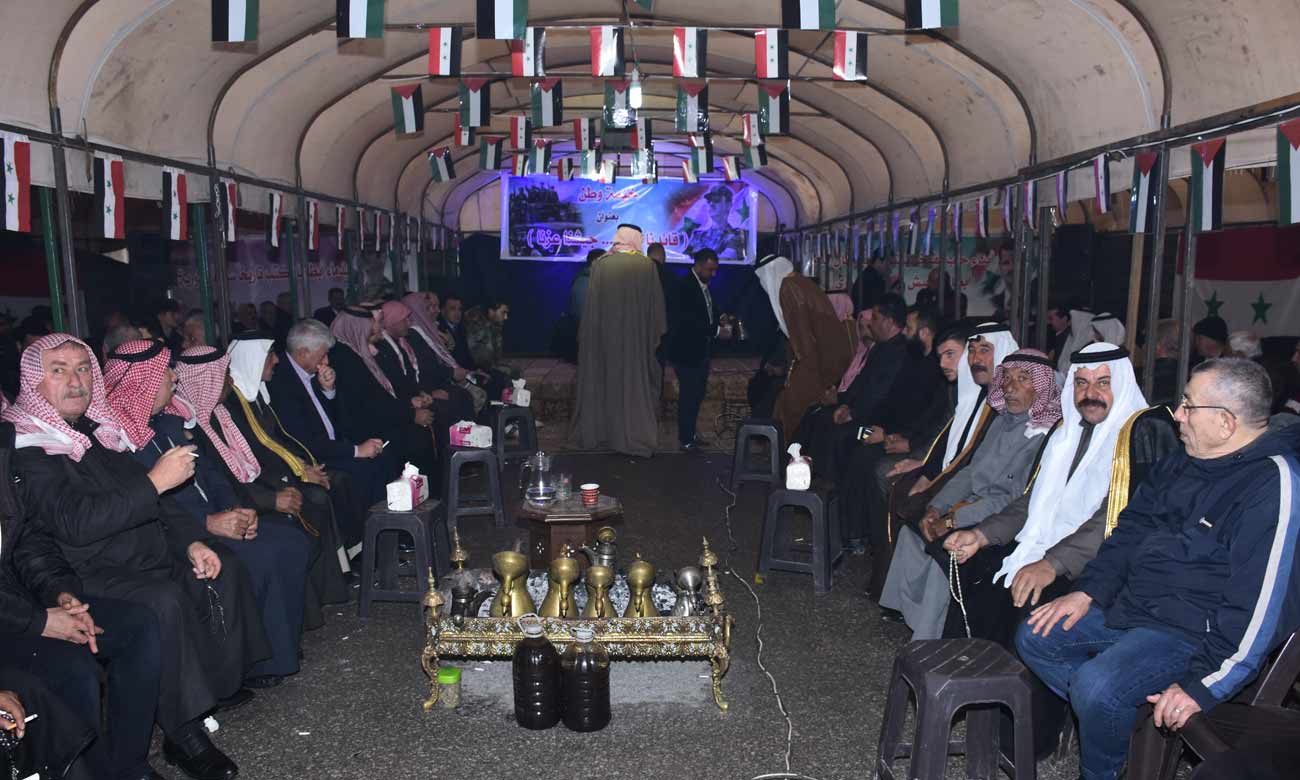

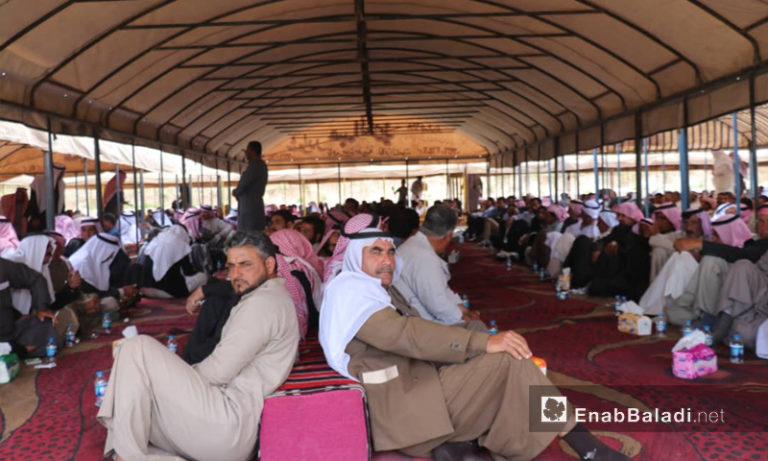
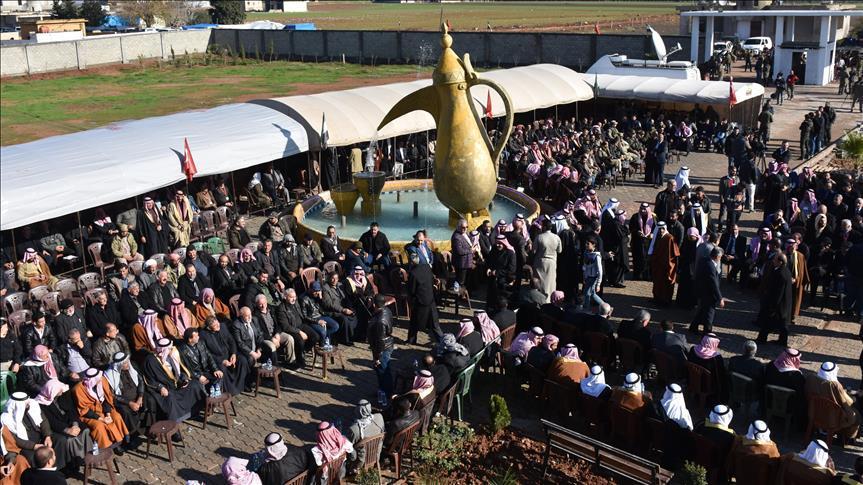








 More In-Depth
More In-Depth